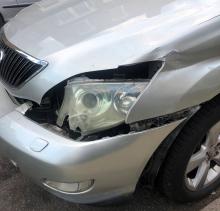Research carried out in the UK suggests that safety problems such as tailgating and speeding are common on UK motorways. According to the survey carried out jointly by road safety body Brake and insurance firm Direct Line, 57% of UK drivers admit to tailgating while 60% admit breaking the speed limit by 16km/h (10mph) or more. Male drivers are far the worst offenders however.
Research carried out in the UK suggests that safety problems such as tailgating and speeding are common on UK motorways. According to the survey carried out jointly by road safety body 3963 Brake and insurance firm 3962 Direct Line, 57% of UK drivers admit to tailgating while 60% admit breaking the speed limit by 16km/h (10mph) or more. Male drivers are far the worst offenders however.
Up to 95% of drivers are at least occasionally concerned about vehicles too close behind them, with 44% concerned every, or most, times they drive on a motorway. By driving too close to the vehicle in front and breaking the speed limit, drivers are leaving themselves far too little time to react in an emergency, risking devastating crashes. Crashes on motorways with 112km/h (70mph) limits are more than twice as likely to result in death as crashes on roads with lower speed limits. In 2012 (most recent data available) there were 88 deaths and 654 serious injuries on UK motorways.
Almost 28% of drivers admit leaving less than a two-second gap between themselves at least once/month with 61% of males admitting to this and 53% of females. Nearly 28% break the 112km/h (70mph) speed limit by 16km/h (10mph) or more. Men are the worst offenders, with 69% doing 128km/h (80mph) or more, and more than 36% doing so at least monthly. This compares with 53% of women admitting to speeding and 22% saying they do so on a monthly basis.
The research is from the UK but it seems more than likely that the figures will be similar to those for most other European nations. On average, female drivers tend to be involved in fewer crashes than males, although it is worth noting female drivers also tend to drive shorter distances/year.
Up to 95% of drivers are at least occasionally concerned about vehicles too close behind them, with 44% concerned every, or most, times they drive on a motorway. By driving too close to the vehicle in front and breaking the speed limit, drivers are leaving themselves far too little time to react in an emergency, risking devastating crashes. Crashes on motorways with 112km/h (70mph) limits are more than twice as likely to result in death as crashes on roads with lower speed limits. In 2012 (most recent data available) there were 88 deaths and 654 serious injuries on UK motorways.
Almost 28% of drivers admit leaving less than a two-second gap between themselves at least once/month with 61% of males admitting to this and 53% of females. Nearly 28% break the 112km/h (70mph) speed limit by 16km/h (10mph) or more. Men are the worst offenders, with 69% doing 128km/h (80mph) or more, and more than 36% doing so at least monthly. This compares with 53% of women admitting to speeding and 22% saying they do so on a monthly basis.
The research is from the UK but it seems more than likely that the figures will be similar to those for most other European nations. On average, female drivers tend to be involved in fewer crashes than males, although it is worth noting female drivers also tend to drive shorter distances/year.





